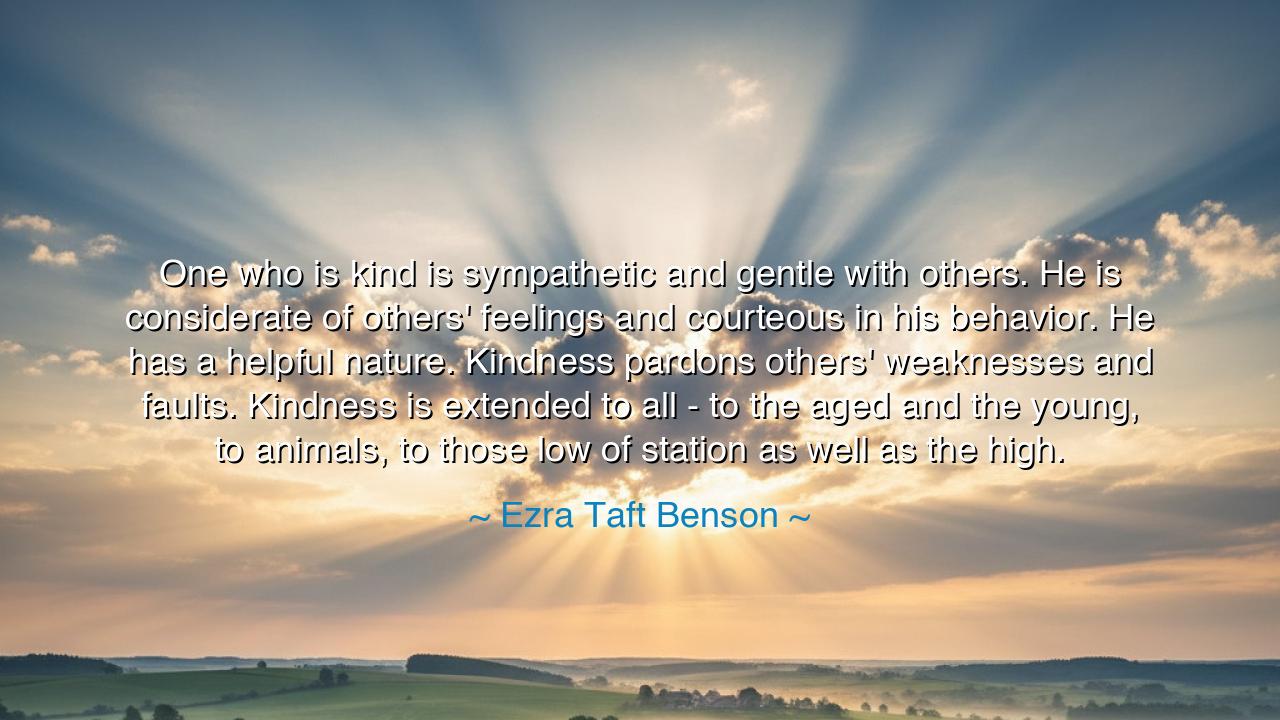
One who is kind is sympathetic and gentle with others. He is
One who is kind is sympathetic and gentle with others. He is considerate of others' feelings and courteous in his behavior. He has a helpful nature. Kindness pardons others' weaknesses and faults. Kindness is extended to all - to the aged and the young, to animals, to those low of station as well as the high.






The words of Ezra Taft Benson—“One who is kind is sympathetic and gentle with others. He is considerate of others' feelings and courteous in his behavior. He has a helpful nature. Kindness pardons others' weaknesses and faults. Kindness is extended to all—to the aged and the young, to animals, to those low of station as well as the high”—speak with the resonance of timeless virtue. Here, kindness is portrayed not as a fleeting sentiment, but as a moral principle, a way of life that shapes the heart, governs conduct, and influences the world. It is both an inner disposition and an outward action, reaching beyond convenience or preference, touching all beings with compassion.
The meaning of this reflection is profound: true kindness is universal, impartial, and active. It does not select recipients based on status, age, or usefulness; it flows to the young and the old, to animals and humans alike, to the humble and the exalted. Kindness pardons failings and forgives transgressions, offering understanding where judgment might prevail. It is a discipline of the heart, an intentional cultivation of sympathy, gentleness, and helpfulness, practiced continuously and without distinction.
History offers shining examples of this principle. Consider Mother Teresa, who devoted her life to the poorest of the poor in Calcutta. Her kindness knew no hierarchy; she ministered equally to the sick, the dying, and the marginalized, seeing in each person the spark of divinity. Her life demonstrates Benson’s teaching that true kindness extends universally, and that its power lies in its impartiality and persistence, shaping not only the lives of others but also the character of the one who gives it.
Even in times of conflict and strife, kindness has proven transformative. Abraham Lincoln, amidst the turmoil of the American Civil War, consistently sought to temper justice with mercy. He pardoned enemies, respected the dignity of his opponents, and recognized the shared humanity even in those who opposed him. Lincoln’s practice illustrates that kindness pardons weaknesses and faults, and that acts of compassion in leadership can heal societies torn by division.
The lesson for us, O seekers, is that kindness is not passive, nor is it a mere feeling. It is deliberate, intentional, and universal. It is expressed in courtesy, consideration, helpfulness, and forgiveness, reaching every living being without distinction. To cultivate kindness is to cultivate a strength of character that resonates outward, influencing hearts, communities, and the moral climate of the world itself.
Practically, this means observing those around you with empathy, noticing needs, and responding with compassion. Speak gently, act helpfully, and forgive freely. Extend care not only to friends and family but also to strangers, animals, and those often overlooked by society. Make kindness habitual and unconditional, allowing it to guide your choices in word and deed. The discipline of kindness is as rigorous as it is rewarding, shaping both the giver and the recipient.
Thus let it be inscribed upon the eternal scrolls: kindness is the virtue that pardons faults, bridges divides, and nurtures the soul. Ezra Taft Benson reminds us that the gentle heart, the courteous word, and the helpful hand are not signs of weakness, but of enduring strength. By embracing kindness as a principle that applies to all—regardless of age, station, or species—we align ourselves with the highest path of humanity, cultivating harmony, respect, and lasting moral power.






AAdministratorAdministrator
Welcome, honored guests. Please leave a comment, we will respond soon